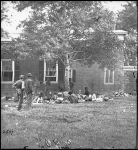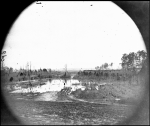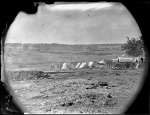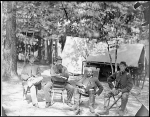
A FAMILY PAPER DEVOTED TO THE NEWS OF THE DAY IN SOUTH DANVERS (PEABODY), MASSACHUSETTS
January 6 – June 29, 1864 - Part VI


Fig. 7. 1 Fredericksburg, Va. Wounded from the Battle of the Wilderness 
Fig. 7.2 James River, Va. Point where Army of the Potomac crossed in June 1864 (Wyanoke Wharf?) 
Fig. 7. 3 Spotsylvania Court House, Va., vicinity. View from Beverly house looking toward Spotsylvania Court House. 
Fig. 7. 4 Officers of the 1st Massachusetts Cavalry at Army of the Potomac headquarters. About the South Danvers Wizard About South Danvers (Peabody), Massachusetts
|
South Danvers Wizard, 6/29/1864,
p. 2/6-7
WAR CORRESPONDENCE – “Camp of the 39th Mass. Vols., near Cold Harbor, Va. – Friend Howard, - We have just been treated to the delectable sounds of our evening tattoo, played on two bursted drums and one or two squeaky fifes – the balance of the instruments belonging to our drum corps having been abandoned during the campaign for want of transportation. We are at the present time supposed to be recuperating our energies for the next movement by the left flank, which many commence at any time. We have been at this place since last Sunday night – the first rest that our brigade has had since May 4th. I can tell you nothing of the general features of the campaign that you do not already know, but a short relation of the experience of the 39th may be acceptable. Our first fight was in the Wilderness, where we relieved another regiment which had broken, and we had a lively time in moving on to the line. Daniel Burnham, of Essex, was killed here, and during the day, one other of the regiment was killed and sixteen wounded. – We essayed a charge about the middle of the afternoon. Our brigade commander advanced gallantly from a clump of pine trees some distance in rear of our line, and bravely waved us forward, and then retired, so that the men might have a clear field and win all the glory. I think that our regiment and one other were all that started to break Lee’s front on this occasion, and we soon came back wiser, and scared most to death. How a man of us escaped the shower of canister that came about our heads, has always been a mystery to me. – Our first experience, you see, was not a peculiarly cheerful one. We were in no other actual fight, while the army remained in the Wilderness, but did the reinforcing, supporting, etc., for anybody who wanted us. On Saturday night, 7th inst., we started over the Fredericksburg road for Spottsylvania C. H., reached Todd’s Farm about daylight; found the rebels there before us; formed brigade line, and advanced through the woods; drove the rebel skirmishers about two miles; captured five horses of a light battery, (which battery limbered to the rear very suddenly, or we should have got guns and all;) halted about five minutes, advanced again about a half mile; came upon the rebel breastworks; tumbled down for want of breath and strength to go further; and those of us who did escape death or capture, considered ourselves at the time remarkably fortunate. It was a most injudicious movement. Think of running over two miles, in a scorching sun, carrying a heavy load, and then, all exhausted as we were, ordering a charge on a strong line of works well defended by fresh men! As the rebels said, the very audacity of the thing saved us from destruction. Those works have been successively attacked by ten times the force since, and have not yet been taken. We lost in this fight six killed, fifty wounded, and thirty-one missing. Col. Davis was sun-struck and Lieut. Col. Peirson, wounded by a buckshot in the arm. Twelve of the missing were re-taken by Sheridan and have since rejoined the regiment. The next Tuesday we were in our next fight, in a thick woods, exposed to a rain of musketry and a cruel flanking fire from a battery for more than six hours. Here Co. Peirson was wounded again, by a shell, and carried from the field. We all thought him dead, but by a lucky chance he escaped, and after an absence of less than a month, is with us again. No braver officer ever went into a fight than Lieut. Col. Peirson of Salem. Our Adjutant was also wounded here in much the same manner, though not so severely, but with the addition of a bad wound in the hand. He bore himself like a soldier. During the whole campaign he was unwell, and should have been in the hospital rather than in the field, but would not leave the regiment. We are all proud of him, and hope to have him with us again soon. It is not necessary for me to mention Col. Davis and his conduct. He can’t live away from the regiment a day. We have reason to be thankful that we have not had cowards to lead us, but men of cool, calm, courage, who say to us ‘come,’ and not ‘go’. You have seen the progress of the army as far as this place by the papers, and that the 39th corps has had its share of work to do. Our regiment has so far built twenty-one lines of breastworks besides its quota of marching and fighting, but the boys were never in better health or spirits than at the present time. Two or three more of Lee’s victories will finish his army. – Look at the map, find Germania Ford on the Rapidan, and you will see that we come about in a straight line to this place. This is what we started to do. Lee has either been whipped or flanked out of every position he has attempted to hold so far, but I suppose he has been victorious in getting back to Richmond at all. Notwithstanding the hard fighting, incessant marching and hard work, we have had to do, the men are as tough and hearty as when they started. It is rare thing for a man to report to the Surgeon for treatment – Since we started on the campaign, the 39th has had but one man reported as a straggler, which certainly speaks well for us, when so many are sent here every day from the rear, under arrest , for skulking from the field, and leaving the ranks for the merest scratches. The marching of the Army of the Potomac never moved so smoothly and noiselessly before. The requisite number of men is always in the right place at the proper time; no surprises have occurred; every man has had to do his proportion of the labor, there being no reserves. Our rations have been issued with great regularity, and a few days at a time, so that the men might have the lightest possible load to carry; and everything seems to indicate a master had at the helm. Field service is not conducive to cleanliness. Four blessed weeks, I lived without a change of clothing. I must have got through with my peck of dirt. What I didn’t eat was thrown down the back of my neck. Occasionally we managed to remove the dirt from our eyes sufficiently to enable us to distinguish a cracker, but farther than this I can say but little. In the words of ‘our correspondent’, the ‘future historian’ will have the tale to tell. The different descriptions of the louse accompanying the army, will also be a pleasing theme for some enthusiastic naturalist. Linebacks, gray-backs, red-heads, tortoise, and many kinds for which no name has been found, rouse the weary soldier from his dreams of home, and quicken his steps on the hot and dusty march. We have come to look, even with complacency, upon those things that would cause a shudder of disgust to agitate the breasts of some of our fair friends at home. This week the wagons containing our baggage were allowed to come up for the first time, and a general change was at once apparent. I think that but one man of Co. A is known to have been killed, so far. Two are at present missing – private Morse and Color Sergeant Cotrell. Morse is wounded and a prisoner. Nothing has been heard from Cotrell. Capt. Nelson has been very fortunate so far, although his health is not good. The youthful fire raging in his system a couple of years ago, does not at present blaze with its former fierceness, though it is certainly very well under control. He feels very desirous of knowing if the quota is full, as he knows a great many who ought to come. Sergeant Blaisdell, who was a prisoner, and re-captured, is with us. The reports of his death were unauthorized by any official information, and must have given his family much needless grief and alarm. Too much care cannot be taken in making reports after a fight. Men are excited, and don’t hardly know what they see or hear. Some will take their oath that they saw a certain man with his head blown away, and before their story is finished, the identical person may come in without a scratch. Blaisdell is looking well and is ready for another dash when the occasion offers. Simonds is at home, I understand, on a furlough. I did not see him in the fight, but his officers say that he charged with the fury of a tiger on the enemy, and if we had had 9,999 more just like him, no force could have withstood our assault. Sergeant J. P. Dodge came out of it without a wound and behaved well. In fact, South Danvers need not be ashamed of her sons in this war. Their record is good, and wherever they may be placed, I am sure they will do their duty. We are all looking for the end, which cannot be far away, when we can exchange these scenes of turmoil, blood, and horror, for the quiet and repose of home. Those who survive may well feel proud of their connection with the Army of the Potomac in its triumphal march to victory, while those who fall will leave a hero’s name and fame behind them. They will die in a just cause, and their memory will be fresh in the hearts of a grateful nation. Yours truly, C. W. H. (Charles W. Hanson) The 39th is now a part of the 1st Brigade, 3d Division, 5th Army Corps. Gen. Crawford commands the Division, and Col. Lyle (90th Pa. Vols.) commands the Brigade. The regiments comprising the brigade are the 39th and 13th Mass., 16th Maine, 99th and 104th Penn., 94th and 104th N.Y.; in all, about 1000 men. |